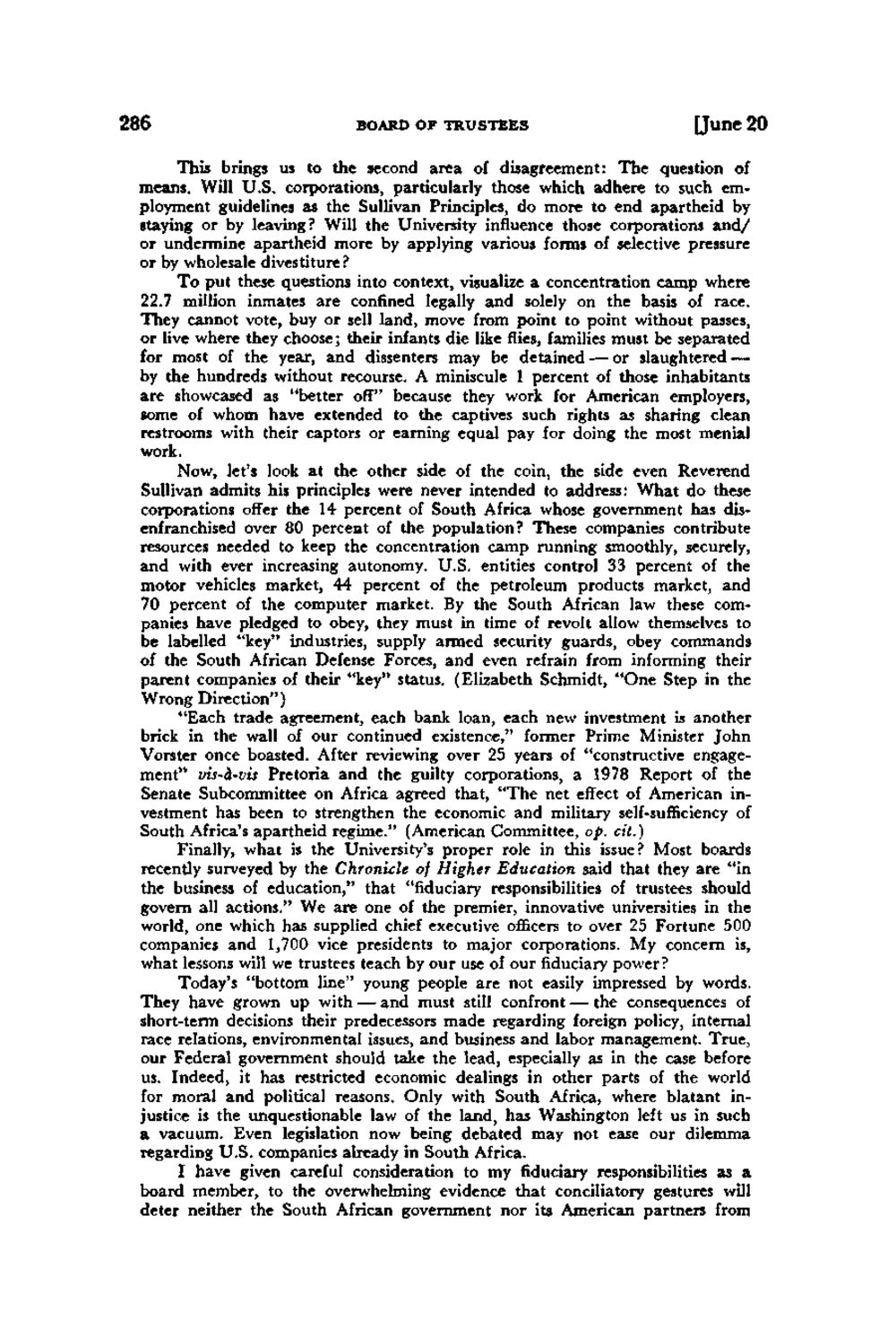| |
| |
Caption: Board of Trustees Minutes - 1986
This is a reduced-resolution page image for fast online browsing.

EXTRACTED TEXT FROM PAGE:
286 BOARD OF TRUSTEES [June 20 This brings us to the second area of disagreement: The question of means. Will U.S. corporations, particularly those which adhere to such employment guidelines as the Sullivan Principles, do more to end apartheid by staying or by leaving? Will the University influence those corporations a n d / or undermine apartheid more by applying various forms of selective pressure or by wholesale divestiture? T o put these questions into context, visualize a concentration camp where 22.7 million inmates are confined legally and solely on the basis of race. They cannot vote, buy or sell land, move from point to point without passes, or live where they choose; their infants die like flies, families must be separated for most of the year, and dissenters may be detained — or slaughtered — by the hundreds without recourse. A miniscule 1 percent of those inhabitants are showcased as "better off" because they work for American employers, some of whom have extended to the captives such rights as sharing clean restrooms with their captors or earning equal pay for doing the most menial work. Now, let's look at the other side of the coin, the side even Reverend Sullivan admits his principles were never intended to address: What do these corporations offer the 14 percent of South Africa whose government has disenfranchised over 80 percent of the population? These companies contribute resources needed to keep the concentration camp running smoothly, securely, and with ever increasing autonomy. U.S. entities control 33 percent of the motor vehicles market, 44 percent of the petroleum products market, and 70 percent of the computer market. By the South African law these companies have pledged to obey, they must in time of revolt allow themselves to be labelled "key" industries, supply armed security guards, obey commands of the South African Defense Forces, and even refrain from informing their parent companies of their "key" status. (Elizabeth Schmidt, "One Step in the Wrong Direction") "Each trade agreement, each bank loan, each new investment is another brick in the wall of our continued existence," former Prime Minister John Vorster once boasted. After reviewing over 25 years of "constructive engagement" vis-el-vis Pretoria and the guilty corporations, a 1978 Report of the Senate Subcommittee on Africa agreed that, " T h e net effect of American investment has been to strengthen the economic and military self-sufficiency of South Africa's apartheid regime." (American Committee, op. cit.) Finally, what is the University's proper role in this issue? Most boards recently surveyed by the Chronicle of Higher Education said that they are "in the business of education," that "fiduciary responsibilities of trustees should govern all actions." We are one of the premier, innovative universities in the world, one which has supplied chief executive officers to over 25 Fortune 500 companies and 1,700 vice presidents to major corporations. My concern is, what lessons will we trustees teach by our use of our fiduciary power? Today's "bottom line" young people are not easily impressed by words. They have grown up with — and must still confront — the consequences of short-term decisions their predecessors made regarding foreign policy, internal race relations, environmental issues, and business and labor management. True, our Federal government should take the lead, especially as in the case before us. Indeed, it has restricted economic dealings in other parts of the world for moral and political reasons. Only with South Africa, where blatant injustice is the unquestionable law of the land, has Washington left us in such a vacuum. Even legislation now being debated may not ease our dilemma regarding U.S. companies already in South Africa. I have given careful consideration to my fiduciary responsibilities as a board member, to the overwhelming evidence that conciliatory gestures will deter neither the South African government nor its American partners from
| |